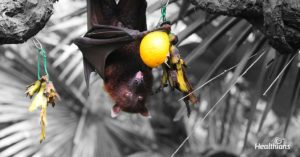Contributed by – Healthians Team
The sudden outbreak of Nipah virus in Kerala has sent a chilling wave of scare throughout the nation. The number of victims succumbing to this virus is increasing with dawn of each day. The disease has created an atmosphere of panic and fear in the whole country. With no proper treatment and vaccines available, Nipah virus is a menace to human life. With not much known about the virus, a situation of confusion is obvious.
There is an urgent need to spread awareness about Nipah virus and how to protect ourselves from it. Highly contagious the virus is engulfing innocent lives at a fast pace. To protect ourselves it is important to have the correct information about the enemy. Understanding all there is about Nipah virus has become the need of the hour.
The Origin
The Nipah virus outbreak was first witnessed in 1998 in Malaysia where the pigs were the intermediate carrier of the virus. The virus infected a large number of pigs causing their death and infecting their caretakers. The virus was identified for the first time in a Malaysian village called Nipah , the virus got the name from its place of origin.
What is Nipah Virus?
As per WHO Nipah virus (NIV) infection belongs to the category known as zoonosis (a disease which is transmitted from an animals to humans). Nipah is a rare virus which is highly contagious with no available vaccine. Prevention and early detection is the only way to fight Nipah virus. Species of fruit bats are the natural host to this virus and are the main source of Nipah virus transmission.

Transmission of Nipah Virus
As stated above bats are the natural host of NIV. The transmission of Nipah virus takes place through:
- Direct contact with the infected bats
- Infected pigs and livestock
- Fruits bitten by the infected bats
- Excreta and sheddings of the bat
- Droplet infection
Nipah virus is highly contagious and can spread through coughing and infected person’s body fluid.
Symptoms
The Nipah virus symptoms are the main source of identification of the infection. The onset of these symptoms needs immediate attention and medical advice. The NIV infection usually takes 5-14 days for the symptoms to appear which includes:
- Abnormal breathing
- Fever
- Headache
- Drowsiness
- Disorientation
- Encephalitis
- Nausea
- Vomiting
- Sore throat
- Muscle pain
The condition can gradually progress into a state of coma within 24 to 48 hours.
Treatment
Nipah virus vaccine is not available at present. Any suspicion and flu like symptoms needs immediate attention, it will only be wise to seek medical assistance. The infected person or victim of Nipah virus needs to be immediately hospitalized for proper care and monitoring.
Prevention
Nipah virus has created a huge terror among all. With very limited options of treatment it is extremely important to prevent the spread of this deadly virus. By incorporating few precautionary steps it is possible to evade the infection. To protect yourselves and your loved ones follow the following preventive measures:
- Be careful while consuming fruits, make sure to wash them properly
- Avoid drinking palm sap as the bats feast on the raw date palm sap
- Do not buy fruits exported from the infected area
- Make sure that fruits are not bitten before consuming them
- Make sure to clean your surroundings to avoid bat droppings
- Fruits like jamun and jackfruit needs to be properly washed as bats feed on these fruits
- Make sure that bats do not nest near your homes
- Visit a doctor on onset of any infection or symptoms
- Wear face mask in public places
- Do not come in direct contact with livestock and infected person
- Prepare barriers to avoid entry of bats in your gardens
- Wash your hands more frequently
- Proper awareness about the infection needs to be spread
Nipah is truly scary and a cause of huge worry but proper knowledge and precaution can help prevent the virus from spreading. Let us together fight this life threatening infection and stop it’s spread.




